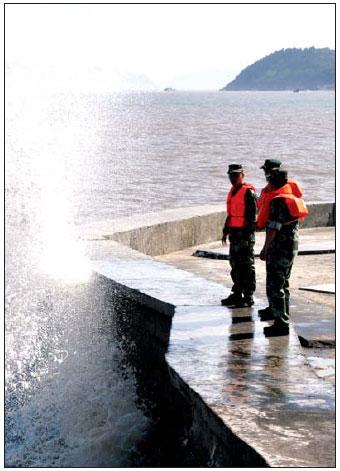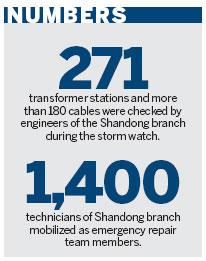
Soldiers in Yuhuan county, Zhejiang province, keeping a close watch along a breakwater on June 24 as tropical storm Meari approaches. [Photo / China Daily]
When tropical storm Meari hit the East coast of China in late June, the State-owned electric-power supplier, State Grid Corp, told its companies in the area to institute emergency plans to make sure facilities could withstand the storm's force.
The storm was detected 358 kilometers south-southeast of Zhoushan, an archipelago in Zhejiang province, at around 10 o'clock in the morning of June 25 and was moving northward at around 30 kilometers an hour.
The grid's company in Zhoushan went into flood-and-storm response mode, alerting all department and staff members, and telling them to get to emergency control centers immediately, to be on call around the clock.
State Grid technicians did extra checks on circuits and the power network connecting the archipelago with the mainland to make sure everything was in proper working condition.
The company also sent people to reservoirs and riverside facilities to check on major equipment such as water gates and pumps.
Local offices put together emergency response teams and made sure that submarine cables would not be damaged by ships sheltering from the storm in local harbors, and that alarm systems and lighting were in good working condition.
That same day, the grid's company in Shandong instituted emergency plans, even though the tropical storm was still far to the south. All its offices in coastal cities were put on notice by phone, fax, or e-mail.
Branch companies and construction sites were told to keep an eye on weather conditions, assemble emergency repair teams and equipment, and to make backup plans for transportation. They also drew up contingency plans for lightning strikes and mudslides.
The plans emphasized the need to act immediately to be sure of the power supply for key government departments, telecommunications networks, mining sites and transportation facilities, if a natural disaster damaged transmission lines or transformers or sub-stations.

Infrastructure construction sites were told to cease operations and look after their temporary housing and machinery and make sure there was sufficient fuel for generators.
State Grid officials in the coastal cities of Weihai, Yantai and Qingdao were told to keep a close watch on the storm as it approached the next day.
The storm hit Shandong at the eastern end in the city of Rongcheng at around 9 pm and left two hours later.
Engineers at the Shandong branch ran checks on 271 transformers and more than 180 cables during the period after assembling more than 1,400 technicians for the emergency repair crew.
The State Grid was set up on Dec 29, 2002 and now employees more than 1.5 million people. It serves 88 percent of the nation and was ranked 8th in the Fortune Global 500 enterprise list last year.
The company's mission is to provide safe, economical, clean and sustainable electric power for social and economic development, according to its official website.





